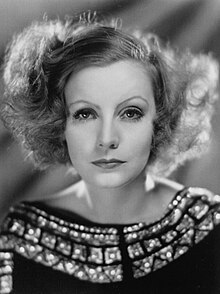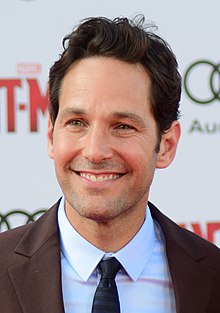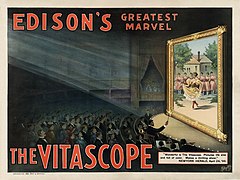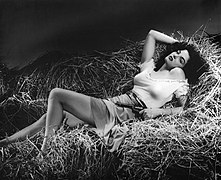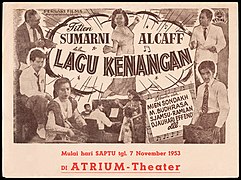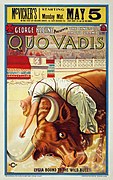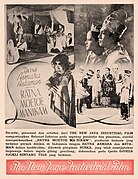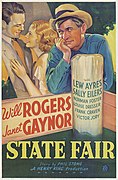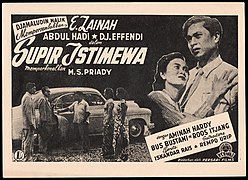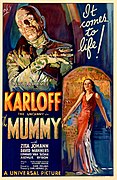Portal:Film
The Film Portal
 A film – also called a movie, motion picture, moving picture, picture, photoplay or (slang) flick – is a work of visual art that simulates experiences and otherwise communicates ideas, stories, perceptions, feelings, beauty, or atmosphere through the use of moving images. These images are generally accompanied by sound and, more rarely, other sensory stimulations. The word "cinema", short for cinematography, is often used to refer to filmmaking and the film industry, and the art form that is the result of it. (Full article...)
A film – also called a movie, motion picture, moving picture, picture, photoplay or (slang) flick – is a work of visual art that simulates experiences and otherwise communicates ideas, stories, perceptions, feelings, beauty, or atmosphere through the use of moving images. These images are generally accompanied by sound and, more rarely, other sensory stimulations. The word "cinema", short for cinematography, is often used to refer to filmmaking and the film industry, and the art form that is the result of it. (Full article...)
Featured articles -
Star Trek is a 2009 American science fiction action film directed by J. J. Abrams and written by Roberto Orci and Alex Kurtzman. It is the 11th film in the Star Trek franchise, and is also a reboot that features the main characters of the original Star Trek television series portrayed by a new cast, as the first in the rebooted film series. The film follows James T. Kirk (Chris Pine) and Spock (Zachary Quinto) aboard the USS Enterprise as they combat Nero (Eric Bana), a Romulan from their future who threatens the United Federation of Planets. The story takes place in an alternate reality that features both an alternate birth location for James T. Kirk and further alterations in history stemming from the time travel of both Nero and the original series Spock (Leonard Nimoy). The alternate reality was created in an attempt to free the film and the franchise from established continuity constraints while simultaneously preserving original story elements.
The idea for a prequel film which would follow the Star Trek characters during their time in Starfleet Academy was discussed by series creator Gene Roddenberry in 1968. The concept resurfaced in the late 1980s, when it was postulated by Harve Bennett as a possible plotline for what would become Star Trek VI: The Undiscovered Country, but it was rejected in favor of other projects by Roddenberry. Following the critical and commercial failure of Star Trek: Nemesis and the cancellation of Star Trek: Enterprise, the franchise's executive producer Rick Berman and screenwriter Erik Jendresen wrote an unproduced film titled Star Trek: The Beginning, which would take place after Enterprise. After the separation of Viacom and CBS Corporation in 2005, former Paramount Pictures president Gail Berman convinced CBS to allow Paramount to produce a new film in the franchise. Orci and Kurtzman were soon approached to write the film, and Abrams was approached to direct it. Kurtzman and Orci used inspiration from novels and graduate school dissertations, as well as the series itself. Principal photography commenced on November 7, 2007, and ended on March 27, 2008. The film was shot in locations around California and Utah. Abrams wanted to avoid using bluescreen and greenscreen, opting to use sets and locations instead. Heavy secrecy surrounded the film's production and was under the fake working title Corporate Headquarters. Industrial Light & Magic used digital ships for the film, as opposed to miniatures used in most of the previous films in the franchise. Production for the film concluded by the end of 2008. (Portal:Film/Featured content)
General images -
Selected image

Sony's Betamax is a 1/2 inch (12.7 millimeter) home videocassette tape recording format introduced on April 16, 1975 (in market on May 10) and derived from the earlier, professional 3/4 inch (19.05 millimeter) U-matic video cassette format.
Did you know...
- ... that fewer than half of the seventy cues composed by Dmitri Shostakovich for the 1971 film King Lear made it into the final cut?
- ... that a 1944 serial film was the first film appearance of Captain America and the first film appearance of any Marvel Comics character?
- ... that the first Russian feature film, Stenka Razin, depicts the historical Cossack leader throwing a princess into the Volga?
- ... that the live-action drama adaptation of Our Dining Table was filmed in the hometown of one of the lead actors?
- ... that 2022 documentary The Australian Wars explores "the great Australian silence" about massacres of Indigenous Australians?
Selected biography -
Greta Garbo (born Greta Lovisa Gustafsson; 18 September 1905 – 15 April 1990) was a Swedish-American actress and a premiere star during Hollywood's silent and early golden eras. Regarded as one of the greatest screen actresses of all time, she was known for her melancholic and somber screen persona, her film portrayals of tragic characters, and her subtle and understated performances. In 1999, the American Film Institute ranked Garbo fifth on its list of the greatest female stars of classic Hollywood cinema.
Garbo launched her career with a secondary role in the 1924 Swedish film The Saga of Gösta Berling. Her performance caught the attention of Louis B. Mayer, chief executive of Metro-Goldwyn-Mayer (MGM), who brought her to Hollywood in 1925. She stirred interest with her first American silent film, Torrent (1926). Garbo's performance in Flesh and the Devil (1926), her third movie, made her an international star. In 1928, Garbo starred in A Woman of Affairs, which catapulted her to MGM's highest box-office star, surpassing the long-reigning Lillian Gish. Other well-known Garbo films from the silent era are The Mysterious Lady (1928), The Single Standard (1929), and The Kiss (1929). (Full article...)Featured lists -
News
- September 2: Tributes paid to recently deceased US actor Chadwick Boseman
- October 7: Mockumentary Mister America has world premiere
- May 16: Actor Doris Day dies at 97
- January 22: Former U.S. intelligence agent Tony Mendez, architect of 'Argo' rescue, dies at 78
- Upcoming events
WikiProjects
Selected quote
Main topics
| Filmmaking |
|---|
 |
| Glossary |
- Terms - Animation • Beta movement • Camera • Cult film • Digital cinema • Documentary film • Dubbing • Experimental film • Fan film • Film crew • Film criticism • Film festival • Film frame • Film genre • Film journals and magazines • Film industry • Film manifesto • Film stock • Film theory • Filmmaking • History of film • Independent film • Lost film • Movie star • Narrative film • Open content film • Persistence of vision • Photographic film • Propaganda • Recording medium • Special effect • Subtitles • Sound stage • Web film • World cinema
- Lists - List of basic film topics • List of film topics • List of films • List of film festivals • List of film formats • List of film series • List of film techniques • List of highest-grossing films • List of longest films by running time • List of songs based on a film or book • Lists of film source material • List of open content films
Featured content
Subcategories
Subportals
Related portals
Things you can do
- Add
{{portal|Film}}to the See also section of film-related articles. - Tag the talk pages of film related articles with the {{WikiProject Film}} banner.
- Explore the list of English language films without an article
- Check tasks and announcements at WPFILM Announcements.
- Collaborate with other participants at Wikipedia:WikiProject Film.
- Join one of the task forces at Wikipedia:WikiProject Film/Sidebar.
Associated Wikimedia
The following Wikimedia Foundation sister projects provide more on this subject:
-
Commons
Free media repository -
Wikibooks
Free textbooks and manuals -
Wikidata
Free knowledge base -
Wikinews
Free-content news -
Wikiquote
Collection of quotations -
Wikisource
Free-content library -
Wikiversity
Free learning tools -
Wiktionary
Dictionary and thesaurus







































![Image 39Louis Poyet [fr]'s engraving of the mechanism of the "fusil photographique" as published in La Nature (april 1882) (from History of film technology)](http://upload.wikimedia.org/wikipedia/commons/thumb/f/f0/Fusil_photographique_Marey2.png/120px-Fusil_photographique_Marey2.png)








